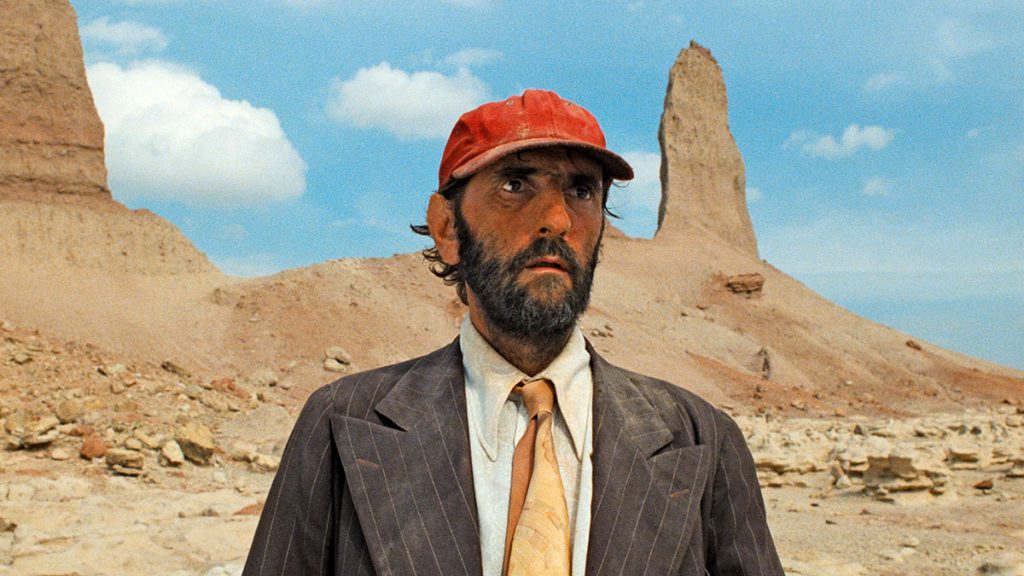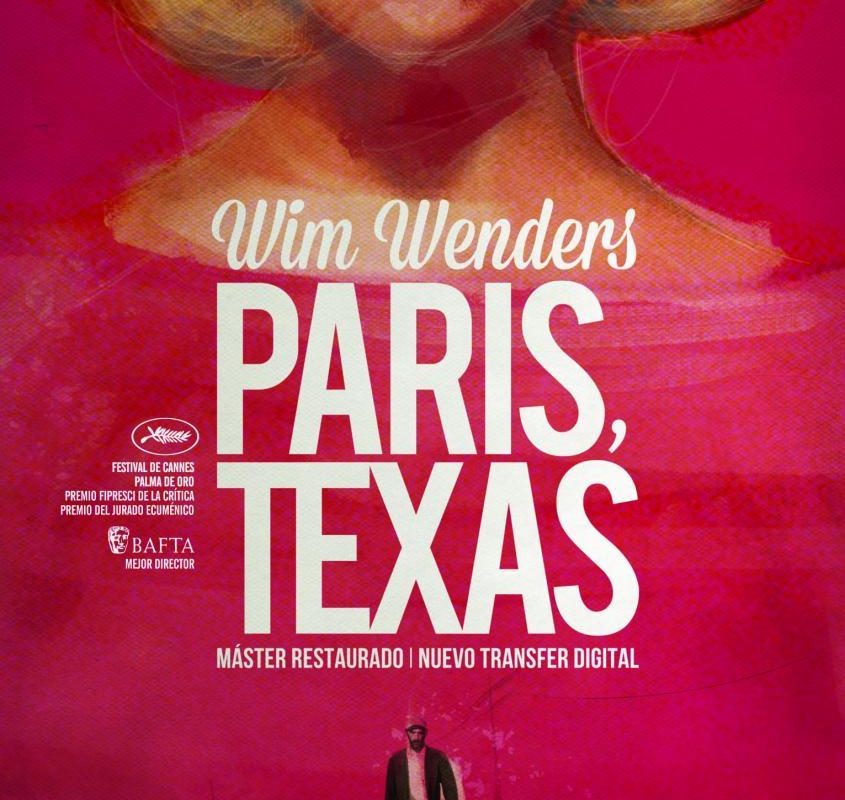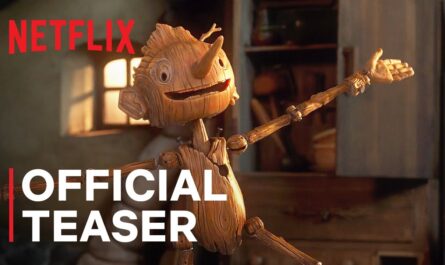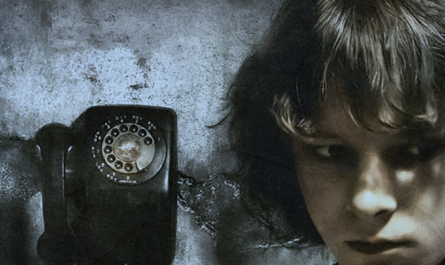Paris, Texas movie (1984), directed by Wim Wenders, is a melancholic road movie about loss, redemption, and reconciliation.
The story follows Travis Henderson (Harry Dean Stanton), a drifter who emerges from the Texas desert after being missing for four years. His brother, Walt (Dean Stockwell), finds him in a small-town hospital and takes him back to Los Angeles, where Walt and his wife, Anne, have been raising Travis’s young son, Hunter (Hunter Carson). At first, Hunter is hesitant to reconnect with his father, but over time, they rebuild their bond.
Determined to find Hunter’s mother, Jane (Nastassja Kinski), Travis and Hunter travel to Houston. They discover that Jane works at a peep-show parlor, where she speaks to customers through a one-way mirror. In a heartbreaking scene, Travis communicates with her from the other side of the glass, revealing his guilt over their past. He recounts their tragic story and how their love deteriorated due to his jealousy and drinking, leading to Jane leaving with Hunter.
Realizing that Jane still loves their son but is lost in her pain, Travis thinks of a plan. He reunites Jane and Hunter at a hotel but chooses to leave them behind, believing that Hunter needs his mother more than him. As Jane embraces her son, Travis watches from afar, then disappears into the night, walking away once more.

Travis Doesn’t Talk
At the beginning of the film, Travis doesn’t talk much. Even his brother, Walt, gets frustrated at him because it’s been four years, and he is barely speaking. The most he speaks to him after their reunion is when he refuses to travel by flight. What I find most interesting is why Travis no longer speaks. It seems like he used to talk openly, but after being gone for four years and losing his family, his thoughts and expressions became internal from the pain and confusion. Some people stop speaking after an impactful and traumatic experience, in this case, he gave up on communicating. I believe some people lose motivation in life from depression, which includes aversion towards sharing thoughts and feelings with others because that too becomes exhausting.
I think Travis drifts because he is looking for himself, he wants to know what went wrong in his relationship, but also what went wrong inside himself. In the end, it is revealed he drank too much and felt immense jealousy, and that pushed away Jane and Hunter. Perhaps he is trying to understand where the jealousy and anger came from. Sometimes, emotions take over us and drive us around as if we became blind machinery, they take over us with such power we try to cope in many unhealthy ways, including unconscious attempts to self-medicate with substances. He is drifting because he is trying to understand what his old self couldn’t.
When in Mexico, he learned Spanish. Why speak to foreigners in another country and go non-verbal with your relatives? It is very easy to shy away from relatives, to push them away, and to become distant when we feel ashamed of ourselves. As social beings, we want to belong, we want to be appreciated and feel welcomed by our family. If we are not our best selves, we don’t want our closest people to see us that way –as if we are afraid or embarrassed of disappointing them–. I think Travis, surrounded by foreigners, felt comfortable enough to be himself; it is easier to let loose when you’re surrounded by strangers whose opinions don’t matter. He most likely felt comfortable being himself and tried figuring out who he was in a different environment than his upbringing. We can learn a lot about ourselves when mirrored through other people. We see aspects of ourselves we hadn’t seen reflected anywhere else, and that is why many people travel abroad or even migrate.
Travis is also ashamed of his past self, and he can’t stand the people he cares about looking back at him with disappointment. He hides his face whenever he talks to Jane, and as soon as he confronts her, he turns around and speaks to her, giving his back. Although there’s no way she can see him because she only sees one side of the mirror, he needs to feel like he is not seen. This is also why he arranges for her to reunite with Hunter but never allows Jane to see him physically. Even his initial communication with Hunter was through a walkie-talkie, as if Travis needed to hide behind something in order to feel comfortable enough to engage in the conversation. He has also changed into a different person and this person has moved on. In a way, he felt he had to get Jane and Hunter back together as a way of making sure they were safe and sound before disappearing once again. He is convinced they are better off without him.

Why did Jane leave?
Ironically, Jane also believes Hunter is better off without her. That is why she leaves Hunter with Walt and Anne. She saves up money for Hunter because she knows he’ll need it eventually and also as a sign of trying to do what she thinks she can do at most. She doesn’t believe she is a good mother, and she is firm that Walt and Anne, as a stable couple, will be more likely to provide a stable and healthier environment for Hunter. She left because she felt lost and confused. In her mind, Hunter needed a mother sure of herself and her circumstances, a mother whose issues wouldn’t spill on his son’s life. She could take care of Hunter from afar without being a burden or an obstacle in his journey.
Unfortunately, Jane was a confused mother because she was also a lost young woman. Travis and Jane started dating when she was in her late teens. Although having children and starting a family at such a young age used to be very common, Jane was still very young and immature to start a family. Her brain and personality hadn’t stopped developing by then. I believe, as a young woman, she had to have a full picture of what she wanted for herself and what she liked and disliked in a man. For example, before having Hunter she loved Travis, but she didn’t realize how uncomfortable Travis’s drinking and jealousy would make her feel until it was too late, making her feel trapped. It would’ve been easier for her to leave Travis if she didn’t have a boy.
As a young woman who was most likely scared of her alcoholic partner, she didn’t know what to do. She wanted to get out of that environment and run away but didn’t know how to manage the situation. At that age, almost no one has enough clarity and assertiveness to overcome a ruptured and dysfunctional family dynamic. That is why she confesses feeling relieved for a moment after Travis had left. Especially considering the amount of attention a child needs, summed up by the amount of attention an alcoholic also needs. It’s like becoming a full-time caretaker of two people, trying to prevent them from injuring themselves and teaching them how to discern and make better choices. Travis should’ve been a support to her, just as much as she was to him. They both should’ve been a pillar to one another and their family, but, the majority of partners and families struggle to keep the boat afloat.
This movie is painful because the melancholy relies on a common human mistake: a broken family. Although we claim we should be the ideal family models and think of our kids and provide endless support to our partners so the entirety of the family can grow, it’s not always realistic. People go through periods of disappointment in life, misunderstandings with themselves, a lack of syntony with their partners, and not knowing how to handle such human experiences. People then cope with substances or try to overcome issues by escaping and leaving everything behind.
Although from an outside perspective, it’s easy to judge Travis and Jane for leaving their son behind and abandoning him. They are an example of many cases around the world of people who felt lost and helpless.
Why do families break?
Families break apart for various reasons, including financial hardship, mental illness, substance abuse, and emotional stress. Poverty, homelessness, and single parenthood can make it difficult for parents to provide stable care, while mental health conditions such as post-natal depression and substance abuse issues can lead to child abandonment. In some cultures, discrimination based on sex or disability, as well as political conditions like war and displacement, contribute to parental abandonment. Additionally, incarceration and a lack of support leave many parents feeling they have no other option but to leave their children behind.
The emotional consequences for abandoned children can be profound, leading to feelings of loss, rejection, insecurity, and low self-esteem, which may impact their ability to form healthy relationships. In the case of Travis and Jane, financial struggles and alcoholism played a key role in their family’s breakdown.Travis was deeply worried about money, and Jane, unable to secure a stable job, resorted to working in a Peep Show Club. This likely contributed to her decision to leave Hunter, as she felt she couldn’t provide the stable home he needed. In their eyes, Walt and Anne offered Hunter a safe and caring home in Verdugo, California, where he received food, shelter, education, and, most importantly, love and acceptance.
However, growing up in a dysfunctional family environment can make it difficult to recognize what is acceptable in relationships, often leading to a cycle of toxic behaviors that repeat through generations. According to statistics, 70%-80% of Americans consider their families dysfunctional, and while family connections are crucial for emotional well-being, they can cause deep distress. People who grow up in such environments may struggle with anxiety, stress, and depression, and they may find it challenging to set healthy boundaries in other relationships. Dysfunctional people are often harsh and critical, refusing to acknowledge others’ needs, manipulating, or guilting others, and avoiding responsibility for their actions. Breaking this cycle requires self-awareness and the ability to establish firm boundaries to protect one’s well-being and prevent these harmful patterns from persisting in future generations.

“Paris, Texas” is a deeply human film that explores the pain of loss, the weight of past mistakes, and the struggle for redemption. Travis and Jane’s journey is not just about finding each other or reuniting with Hunter; it’s about confronting the ghosts of their past and acknowledging their progress. Their separation is not just an act of abandonment but a tragic attempt at protecting the ones they love from the damage they think they carry.
The film suggests that sometimes, love means letting go. Travis believes that Jane and Hunter are better off without him, just as Jane once believed the same. This cycle of self-doubt and guilt is all too common in broken families, where love exists but is trapped with pain, regret, and the fear of failing those closest to us.
“Paris, Texas” is a reflection on human frailty and the difficult choices people make in search of a better life. While Travis disappears into the night, bringing Jane and Hunter together suggests a quiet hope for the future. Even when families fracture, there remains the possibility of healing, even if it comes in unexpected ways.
McNulty Counseling. Moving Past Dysfunctional Families. McNulty Counseling, https://mcnultycounseling.com/moving-past-dysfunctional-families/






**mindvault**
mindvault is a premium cognitive support formula created for adults 45+. It’s thoughtfully designed to help maintain clear thinking
**sugarmute**
sugarmute is a science-guided nutritional supplement created to help maintain balanced blood sugar while supporting steady energy and mental clarity.
**glpro**
glpro is a natural dietary supplement designed to promote balanced blood sugar levels and curb sugar cravings.
**prostadine**
prostadine is a next-generation prostate support formula designed to help maintain, restore, and enhance optimal male prostate performance.
**prodentim**
prodentim an advanced probiotic formulation designed to support exceptional oral hygiene while fortifying teeth and gums.
**vitta burn**
vitta burn is a liquid dietary supplement formulated to support healthy weight reduction by increasing metabolic rate, reducing hunger, and promoting fat loss.
**glucore**
glucore is a nutritional supplement that is given to patients daily to assist in maintaining healthy blood sugar and metabolic rates.
**synaptigen**
synaptigen is a next-generation brain support supplement that blends natural nootropics, adaptogens
**nitric boost**
nitric boost is a dietary formula crafted to enhance vitality and promote overall well-being.
**wildgut**
wildgutis a precision-crafted nutritional blend designed to nurture your dog’s digestive tract.
**mitolyn**
mitolyn a nature-inspired supplement crafted to elevate metabolic activity and support sustainable weight management.
**zencortex**
zencortex contains only the natural ingredients that are effective in supporting incredible hearing naturally.
**yusleep**
yusleep is a gentle, nano-enhanced nightly blend designed to help you drift off quickly, stay asleep longer, and wake feeling clear.
**breathe**
breathe is a plant-powered tincture crafted to promote lung performance and enhance your breathing quality.
**pinealxt**
pinealxt is a revolutionary supplement that promotes proper pineal gland function and energy levels to support healthy body function.
**energeia**
energeia is the first and only recipe that targets the root cause of stubborn belly fat and Deadly visceral fat.
**prostabliss**
prostabliss is a carefully developed dietary formula aimed at nurturing prostate vitality and improving urinary comfort.
**boostaro**
boostaro is a specially crafted dietary supplement for men who want to elevate their overall health and vitality.
**potentstream**
potentstream is engineered to promote prostate well-being by counteracting the residue that can build up from hard-water minerals within the urinary tract.
**hepatoburn**
hepatoburn is a premium nutritional formula designed to enhance liver function, boost metabolism, and support natural fat breakdown.
**hepatoburn**
hepatoburn is a potent, plant-based formula created to promote optimal liver performance and naturally stimulate fat-burning mechanisms.
**flow force max**
flow force max delivers a forward-thinking, plant-focused way to support prostate health—while also helping maintain everyday energy, libido, and overall vitality.
**prodentim**
prodentim is a forward-thinking oral wellness blend crafted to nurture and maintain a balanced mouth microbiome.
**cellufend**
cellufend is a natural supplement developed to support balanced blood sugar levels through a blend of botanical extracts and essential nutrients.
**neurogenica**
neurogenica is a dietary supplement formulated to support nerve health and ease discomfort associated with neuropathy.
**revitag**
revitag is a daily skin-support formula created to promote a healthy complexion and visibly diminish the appearance of skin tags.
Your point of view caught my eye and was very interesting. Thanks. I have a question for you. https://www.binance.info/ES_la/register?ref=VDVEQ78S
Thank you for your sharing. I am worried that I lack creative ideas. It is your article that makes me full of hope. Thank you. But, I have a question, can you help me? https://www.binance.info/register?ref=IHJUI7TF
Can you be more specific about the content of your article? After reading it, I still have some doubts. Hope you can help me. https://www.binance.info/register?ref=IXBIAFVY
Slot game tại xn88 bshrf được tối ưu hóa cho thiết bị di động: tải nhanh, tiêu tốn ít pin, hỗ trợ cảm ứng mượt mà và tương thích với cả mạng 3G/4G – chơi mọi lúc, mọi nơi mà không cần WiFi. TONY01-29O
Đăng ký tài khoản tại đây là bước đầu tiên để bạn có thể tham gia vào các trò chơi và dịch vụ cá cược trực tuyến hấp dẫn. khuyến mãi 188v Quy trình này vô cùng đơn giản, chỉ mất vài phút để hoàn tất. Dưới đây là hướng dẫn cụ thể để bạn có thể dễ dàng tạo tài khoản và bắt đầu trải nghiệm ngay. TONY02-03
Thanks for sharing. I read many of your blog posts, cool, your blog is very good.